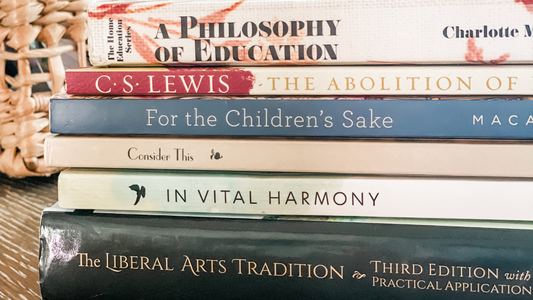You may hear the term "classical education" and be unsure what this means, and which educational approaches fall within the classical tradition.
First, we must remember that all educational philosophies will have an anthropology- an understanding of what a person is. All philosophies will consider:
-What is a person?
-What is education?
-How then shall we learn?
Sometimes these questions are addressed intentionally, as we see in classical education and in Charlotte Mason's principles. In other methods, these questions will be answered less directly.
Classical Education
Classical education seeks to form the whole person. It seeks to cultivate wisdom and virtue, and to nourish the soul with what is good, true, and beautiful through the study of the liberal arts and great books.
Classical education has a long and rich history, dating back to the classical world of Greece, Rome, and beyond. Additionally, it is known as utilizing the trivium (grammar, logic, rhetoric) and the quadrivium (arithmetic, geometry, astronomy, music) which form the seven liberal arts.
Classical Christian Education
When we discuss a Christian classical education, we are acknowledging that true wisdom and virtue is found in Christ and that all truth, goodness, and beauty are found in Christ.
We acknowledge that all of mankind is made in God's image, and that we live in a fallen world. True formation of character is only by God's grace, in Christ, through the power of the Holy Spirit.
Charlotte Mason
Charlotte Mason was a late 1800s-early 1900s British educator and philosopher. As a Christian with a biblical worldview, Mason acknowledged that all children are born persons. She believed all children, regardless of social status, deserved an education.
Her methods are characterized by the use of living books, narration, habit training, the science of relations, and short, varied lessons. She taught that children's minds must be nourished with a wide and generous feast of living ideas.
Mason's principles and ideas were drawing from this deep classical tradition, while being firmly rooted in the truths of Scripture. She taught that God is the Supreme Educator and that children must learn about God, His universe, and His people.
She prioritized the atmosphere of a life-giving learning environment, the discipline of habits, and a feast of living ideas.
Neoclassical
A neoclassical approach to education was popularized by British scholar Dorothy Sayers' speech "The Lost Tools of Learning" in 1947. It was later published as an essay in 1948.
In her essay, Sayers reapplied the trivium in a modern way by assigning the three aspects of the trivium to children's developmental stages. This "ages and stages" approach is often found in classical Christian education curricula and programs such as Classical Conversations.
Some argue that any classical education applied today is considered "neoclassical" because we do not want to exactly replicate the Greek and Roman education of past years and that we will always be modernizing a classical education. While this idea is true, the term "neoclassical" is most frequently used to refer to the specific method of education where the trivium has been reapplied to an "ages and stages" model.
It's essential to note that many aspects of this neoclassical model are no longer drawing on classical tradition. This is most clearly seen in the way neoclassical methods approach memory work.
For an excellent overview of classical education and Charlotte Mason (and how the neoclassical model does not fall within this tradition), I highly recommend the work of Karen Glass, especially her book Consider This.
Resources:
Consider This by Karen Glass
Beautiful Teaching's article "What is Classical Education?"
Beautiful Teaching's article "Neoclassical vs. Classical"
Karen Glass's article "Charlotte Mason and the Classical Tradition"
The New Mason Jar podcast episode





